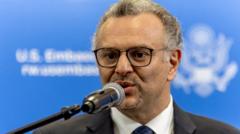Massad Boulos, Senior Advisor for Africa, asserts that Trump's administration, while implementing significant aid cuts, still prioritizes Africa within its foreign policy agenda. The aid reductions have led to pressing humanitarian issues, particularly in health programs, but the administration emphasizes improved efficiency in aid allocation.
Trump's Engagement with Africa: A Complex Relationship Amid Aid Cuts

Trump's Engagement with Africa: A Complex Relationship Amid Aid Cuts
US envoy assures that Africa remains a focus for Trump despite assistance reductions
In a recent interview with BBC's Newsday, Massad Boulos, the US Senior Advisor for Africa, emphasized that despite controversial aid cuts from the Trump administration, Africa remains a critical area of focus for President Donald Trump. Boulos pointed out that these decisions aim to reinforce transparency and ensure that the funds allocated are being utilized effectively. The cuts, introduced soon after Trump took office, have significantly impacted various health programs across the continent, particularly those providing essential HIV medications to countries like Nigeria, Kenya, and Lesotho.
"President Trump highly values Africa and the African people," Boulos stated, attempting to mitigate the negative perceptions generated by the aid freeze that has left millions in peril. This suspension of assistance, according to various organizations, threatens to plunge nearly six million more Africans into extreme poverty next year and has caused dire situations, like the cholera deaths in South Sudan due to health facility closures.
While Boulos insisted that the reported deaths could not be directly attributed to the aid cuts, he maintained that a reevaluation of foreign aid is necessary to maximize its effectiveness. The administration's approach, he argued, is not solely about benefiting economically but also about nurturing strategic partnerships across the continent.
Boulos remarked on the heightened interest from US companies in accessing the mineral wealth of the Democratic Republic of Congo (DRC), asserting that US involvement could potentially stabilize the region currently plagued by conflict. He also touched upon concerns over Rwanda's military activities in the DRC, emphasizing that peace must precede economic collaboration.
Moreover, the Trump administration's trade policies, including specific tariffs on goods from certain African nations, warrant attention as they carry implications for US-Africa relations. Boulos claimed that most African nations would not be adversely affected by these tariffs, which predominantly impact small trade volumes. However, countries like Lesotho, which rely heavily on exports to the US, could suffer if trade agreements aren't refreshed.
Despite concerns about the future of US diplomatic missions in Africa, Boulos reassured that the strategic importance of the continent remains a cornerstone of US policy. As the administration strives for a more equitable relationship with Africa, observers maintain a watchful eye on the evolving dynamics of international relations on the continent.





















